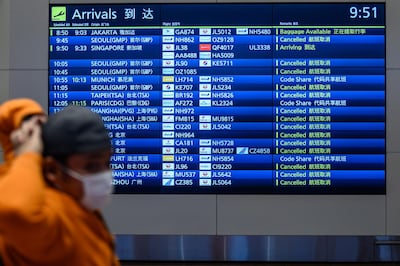The outbreak of Covid-19 is not only a public health emergency, it has also shaken financial markets, the travel industry, businesses, supply chains and the global economy.
All of these disruptions affect insurance coverage. People want to know whether their health cover protects them if they need to get tested or treated for Covid-19, whether their travel policy protects them if they need to cancel flights or have a medical emergency, and whether their life insurance covers them if they become critically ill or even die from the novel coronavirus.
“We have not seen an event of this nature in today’s very interconnected world,” Alison Martin, Emea chief executive of Swiss insurer Zurich, told CNBC on March 6. “How long is this impact expected to last for? I suspect we’re going to be seeing this in the years to come, rather than just in the weeks and the months to come.”
Covid-19, which originated in the Chinese city of Wuhan, has now spread to more than 100 countries, infecting more than 119,000 people and killing over 4,200. More than 65,000 have recovered.
In the UAE, where the latest tally of cases is 74, schools have closed for four weeks until April 4, the government has discouraged travel and many companies are allowing staff to work from home.
So how have insurance providers around the world responded to the crisis?
Some health, travel and life insurance companies are adapting their policies, either to better serve their customers or on orders from the government. In the Emirates, for example, under a directive from the UAE Ministry of Health and Prevention in January, suspected or confirmed cases of Covid-19 must be treated as emergency cases free of cost, regardless of what insurance cover the patient has.
Insurers are also making customers aware of the exclusions that apply, which can leave some consumers out of luck. For travel insurance, for example, claims due to “known” events, an epidemic or fear of travel are often not covered. For life insurance, Covid-19 is not classified as a “critical illness” and would be excluded from critical illness cover.
Here's how insurance providers are handling coronavirus-related claims:
Health insurance
In the UAE, a January 30 circular sent to all health facilities licensed by the Dubai Health Authority states that “based on the directives received from the Ministry of Health and Prevention” all suspected or confirmed cases of novel coronavirus must be considered as “emergency cases”.
If the patient is insured, “insurance companies will honour any claims received”. Even if the patient is uninsured, suspected or confirmed cases “will not bear any payment of healthcare costs at healthcare facilities”. This is understood to be applicable throughout the UAE.
Jerome Droesch, chief executive of Cigna in the Middle East and Africa, says the insurer is “fully aligned and following the guidelines issued by regulatory bodies, including the UAE Ministry of Health and local health authorities across the region, alongside the World Health Organisation and the US Centres for Disease Control and Prevention (CDC)”.
"Confirmed Covid-19 cases will be treated as emergencies and costs for eligible treatment as required by medical professionals will be covered," Mr Droesch tells The National.

In the US, where there are over 1,000 cases and more than 30 deaths, officials fear healthcare costs will dissuade more than 28 million uninsured Americans from getting tested for the virus. So far, the CDC has picked up the tab for coronavirus diagnostics. Certain states, such as New York, Washington and Nevada, have already ordered health plans to waive co-pays and deductibles for coronavirus testing.
Last week America’s Health Insurance Plans (AHIP), a trade association of health insurers, said it would take steps to alleviate cost concerns and potentially waive co-pays. Separately, David Cordani, president and chief executive of Cigna, announced the insurer would “waive all co-pays and cost-shares for coronavirus testing for our customers that is recommended by their health practitioners”.
Japan, which has more than 1,200 cases and has been criticised for a slow approval process to get tested, is covering screenings with its national health insurance from Friday.

Travel insurance
Travel disruption is rife due to the coronavirus outbreak with government bans, flight cancellations and recommendations on places to avoid.
On March 5, the UAE Ministry of Health of Prevention asked all citizens and residents to avoid travelling due to Covid-19. A statement released by the ministry on Tuesday said passengers who return from “countries of concern” or from one of the top 10 countries reporting local transmission of the virus will have to undergo home isolation for 14 days. The countries of concern include China, Italy, Iran, South Korea, Japan, Germany, Singapore and France.
When it comes to making a travel insurance claim, it matters whether a flight is cancelled because of a ban or if it is only due to an abundance of caution or under guidance from public health authorities.
The accepted cancellation reasons listed in Dnata Travel’s insurance through AIG, for example, include: "If after the time you booked your trip an official government agency advises against all (but essential) travel to your intended destination”.
A call centre agent with Axa in the UAE said the insurer offers two types of travel insurance plans: one that only covers emergency medical expenses for around Dh150 and one that also covers “travel inconveniences” for Dh680. A refund in case of cancellation would only apply with the second plan and only if the government is restricting travel to that country.
Axa also currently does not offer travel insurance to 17 countries, including China, South Korea, Iran, Thailand, North Korea, Iraq, Afghanistan and the Central African Republic, either because of Covid-19 or other situations. Italy was just added to Axa's list this week.
Hitesh Motwani, chief marketing officer of InsuranceMarket.ae, says the comparison website has seen a 30 to 40 per cent increase in the number of travel insurance enquiries since the start of March.
"Unfortunately, travel insurance companies are not really covering this," Mr Motwani says. However, some airlines, such as Emirates and Etihad, are accommodating changes without fees.
Travel insurance usually does not cover an epidemic or pandemic for cancellation, he says, especially if a traveller has booked a ticket after the outbreak was already known. He explains that insurance policies usually include a clause that says “any circumstance leading to the relevant delay or cancellation of the flight which is existing, expected or announced before the journey is booked, is not covered”.
Jonathan Rawling, chief financial officer of yallacompare.com, says "travel insurance covers less than most people would think it covers". While emergency medical costs are well covered, cancellation policies are rather narrow.
Life insurance
Life insurance consists of three components: term protection, which covers death; critical illness; and total permanent disability.
Dr Khatchik Kinoyan, head of underwriting — life insurance for Zurich in the Middle East, says their life policies do not exclude death due to epidemics or pandemics. As for critical illness, a payout is only made if the insured is diagnosed with any of the critical diseases listed in the policy’s terms and conditions.
“This will often include conditions such as cancer, heart disease and stroke. Coronavirus is not one of the listed diseases,” Mr Kinoyan says.
Ayman Hout, chief executive of Marsh UAE, a global professional services firm with operations in insurance broking and risk management, says policies can differ and it is important to check the terms and conditions in detail.
“We recommend that clients review their policy documents carefully with their insurance broker or provider to see what exactly is covered and look for any ‘epidemic exclusion’,” he says.
While the mortality rate from Covid-19 is still relatively low, life insurance companies will be hit hard regardless. A March 5 report from global credit ratings agency DBRS Morningstar said the outbreak will result in: increased incurred claim costs, including death and disability claims, and drug costs; adverse movements in the financial markets reducing profitability; and business interruption and potential impact on revenue.
No one is immune to the knock-on effects of Covid-19’s spread.


